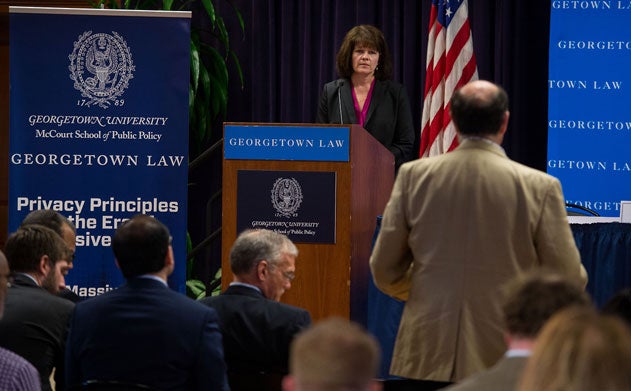
CONCERNS ABOUT PRIVACUY and the use of huge data sets can be addressed through a coalition of academics and other stakeholders, Federal Trade Commissioner Maureen Ohlhausen told a Georgetown audience today.
“Although some potential uses of big data raise concerns about privacy and other values, we can add those concerns together, with a coalition of academics, regulators, businesses and consumers,” Ohlhausen said at a university forum on “Privacy Principals in the Era of Massive Data.”
The use of such data, she said, is a “powerful tool with great promise and some risks” that is neither a “miracle cure or a plague.”
The event, sponsored by the university’s McCourt School of Public Policy and the Law Center, also included a panel moderated by McCourt School Dean Edward Montgomery.

From left, Edward Montgomery, dean of the McCourt School of Public Policy; Julie Cohen, law professor; Chris Wolf, a partner of Hogan Lovells LLP and co-chair of the Future of Privacy Forum; Benjamin Wittes, a senior fellow in governance studies at the Brookings Institution; and Robert Groves, Georgetown provost, participate in the “Privacy Principles in the Era of Massive Data” event panel.
Panelists included Robert Groves, Georgetown provost; Julie Cohen, law professor; Benjamin Wittes, a senior fellow in governance studies at the Brookings Institution; and Chris Wolf, a partner of Hogan Lovells LLP and co-chair of the Future of Privacy Forum.
“We have to acknowledge that mixing data sources across domains, across silos is necessary for common good uses,” Groves said at the forum. “…and we need the developments out of computer science and statistics to allow a user, a researcher whose only interested in statistical properties of large data sets to access them without interest or knowledge of individuals within the data set.”
“We need a set of privacy policies that focus on the benefit of big data for common good purposes as well as privacy concerns of individuals,” Groves added.
The Massive Data Institute at the McCourt School is expected to use large data sets to increase understanding of society and human behavior with the aim of improving public policy decision-making.
Cohen said the institute should “help us figure out how to use big data responsibly, including how to develop ethical and technical safeguards that preserve the gaps for privacy…”
Wolf suggested that the use of internal review boards could be helpful as privacy mechanisms.
“Internal review boards may better promote institutional accountability when looking at big data practices,” he said. “This is something that’s done in the medical life sciences realm all the time and review boards could serve as effective institutional checks by evaluating the selection of data sources and analytical sources…”
Also explored at the event was the collection of data for one reason that is used for other purposes.
“I really want to focus on not just new use that are not in the same context but new uses that are hostile in some sense to the interests of the donors (of the data),” Wittes said.